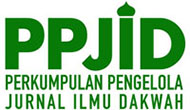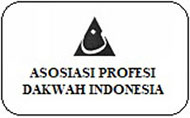Islamic Televangelism: Controversy and Da'wah Contest in Television Media
Abstract
Digital technology has had a significant impact on several aspects of human life, especially on religious aspects. The birth of this religious fragmentation encouraged the presence of new religious, contemporary preachers and new audiences who contribute to revitalizing the debate over religious symbols. This article proposes thinking around the aspects that led to the development of the debate and contestation surrounding da'wah within the context of Islamic televangelism. The method used in this study is a qualitative descriptive method utilizing field observations and direct interviews with one of the Ustaz on television. The results of this study indicate that da'wah programs that are broadcast through television media give birth to a religious authority that is built between preaching actors thanks to the Islamic televangelism media. The contestation regarding religious authority, which was obtained thanks to its popularity in the television media, gave birth to the figure of a religious entrepreneur. Islamic televangelism has also sparked various controversies through preaching on television media, such as reprimands from KPI and even among fellow scholars.
Keywords
Full Text:
PDFReferences
Barkin, G. (2014). Commercial Islam in Indonesia: How television producers mediate religiosity among national audiences. In International Journal of Asian Studies. https://doi.org/10.1017/S1479591413000181
Cadge, W. (2012). Religion and Modern Society: Citizenship, Secularisation and the State. Contemporary Sociology: A Journal of Reviews. https://doi.org/10.1177/0094306112443520ll
Cocker, H. L., & Cronin, J. (2017). Charismatic authority and the YouTuber: Unpacking the new cults of personality. Marketing Theory. https://doi.org/10.1177/1470593117692022
Deuraseh, N. (2017). Transformasi Amalan Perubatan Tradisional Melayu Perspektif Rukyah. Jurnal Peradaban.
Echchaibi, N. (2007). Republican betrayal: Beur FM and the suburban riots in France. Journal of Intercultural Studies. https://doi.org/10.1080/07256860701429725
Gendron, A. (2016). The call to jihad: Charismatic preachers and the internet. In Violent Extremism Online: New Perspectives on Terrorism and the Internet. https://doi.org/10.4324/9781315692029-3
Hoesterey, J. B. (2008). Marketing morality: The rise, fall and rebranding of Aa Gym. In Expressing Islam: Religious Life and Politics in Indonesia. https://doi.org/10.1355/9789812308528-010
Hoesterey, J. B. (2012). Prophetic Cosmopolitanism: Islam, Pop Psychology, and Civic Virtue in Indonesia. City and Society. https://doi.org/10.1111/j.1548-744X.2012.01067.x
Howell, J. D. (2005). Muslims, the new age and marginal religions in Indonesia: Changing meanings of religious pluralism. In Social Compass. https://doi.org/10.1177/0037768605058151
Jannah, E. U. (2019). TELAAH HADIS-HADIS HISAB RUKYAH (Studi Hadis dan Aṡar Sahabat tentang Hisab Rukyah Awal Bulan Kamariah). ELFALAKY. https://doi.org/10.24252/ifk.v3i2.14151
Jechoutek, K. G. (2018). Religious Ethics in the Market Economy. In Religious Ethics in the Market Economy. https://doi.org/10.1007/978-3-319-76520-4
Kailani, A.-N. P. & N. (2010). Islam and the 2009 Indonesian Elections, Political and Cultural Issues the Case of the Prosperous Justice Party (Pks). In Irasec.
Kiptiyah, S. M. (2018). KYAI SELEBRITI DAN MEDIA BARU. Jurnal Masyarakat Dan Budaya. https://doi.org/10.14203/jmb.v19i3.495
Lahmuddin, L. (2012). PSIKOTERAPI DALAM PERSPEKTIF BIMBINGAN KONSELING ISLAMI. MIQOT: Jurnal Ilmu-Ilmu Keislaman. https://doi.org/10.30821/miqot.v36i2.124
Moll, Y. (2010). Islamic Televangelism: Religion, Media and Visuality in Contemporary Egypt Y. Arab Media & Society.
Mupida, S. (2019). MEDIA BARU DAN KONFLIK POLITIK ISLAM DI INDONESIA. Idarotuna. https://doi.org/10.24014/idarotuna.v2i1.8185
Mupida, S. (2020). Penyembuhan Islam dan Otoritas Keagamaan: Studi Kasus Ustaz Dhanu. Hanifiya: Jurnal Studi Agama-Agama. https://doi.org/10.15575/hanifiya.v3i1.8095
Muzakki, A. (2012). Islamic Televangelism in Changing Indonesia: Transmission, Authority, and the Politics of Ideas. In Global and Local Televangelism. https://doi.org/10.1057/9781137264817_3
Perrot, T. (2016). Dorothea E. SCHULZ (2012), Muslims and New Media in West Africa. Pathways to God. Communication. https://doi.org/10.4000/communication.6987
Sounaye, A. (2013). Alarama is all at once: Preacher, media savvy, and religious entrepreneur in Niamey. Journal of African Cultural Studies. https://doi.org/10.1080/13696815.2012.749782
Sunarwoto. (2016). Salafi Dakwah Radio: A Contest for Religious Authority. Archipel. https://doi.org/10.4000/archipel.314
Sunarwoto, S. (2012). Radio Fatwa: Islamic Tanya-Jawab Programmes on Radio Dakwah. Al-Jami’ah: Journal of Islamic Studies. https://doi.org/10.14421/ajis.2012.502.239-278
Syahputra, I. (2018). PENGGUNAAN MEDIA SOSIAL DAN KEMARAHAN RELIGIUS DALAM KASUS PEMBAKARAN VIHARA DI KOTA TANJUNG BALAI, INDONESIA. Epistemé: Jurnal Pengembangan Ilmu Keislaman. https://doi.org/10.21274/epis.2018.13.1.149-172
Triantoro, D. A. (2020). USTAZ YOUTUBE: USTAZ ABDUL SOMAD AND THE DYNAMICS OF CHANGING RELIGIOUS AUTHORITIES. Penamas. https://doi.org/10.31330/penamas.v33i2.405
Turley, A. C. (2017). Max weber and the Sociology of Music. In Max Weber. https://doi.org/10.4324/9781315264882
Watson, C. W. (2005). A popular Indonesian preacher: The significance of Aa Gymnastiar. In Journal of the Royal Anthropological Institute. https://doi.org/10.1111/j.1467-9655.2005.00261.x
Zaman, M. Q. (2009). The ulama and contestations on religious authority. In Islam and Modernity: Key Issues and Debates. https://doi.org/10.1515/9780748637942-009
DOI: http://dx.doi.org/10.24014/jdr.v33i2.21826
Refbacks
- There are currently no refbacks.

This work is licensed under a Creative Commons Attribution-ShareAlike 4.0 International License.
Editorial Office:
2nd Floor, Building of Faculty of Da'wah and Communication, Universitas Islam Negeri Sultan Syarif Kasim Riau. Jl. HR Soebrantas Km 15, Simpangbaru, Tampan, Pekanbaru
Email : jurnalrisalah@uin-suska.ac.id

This work is licensed under a Creative Commons Attribution-ShareAlike 4.0 International License.














